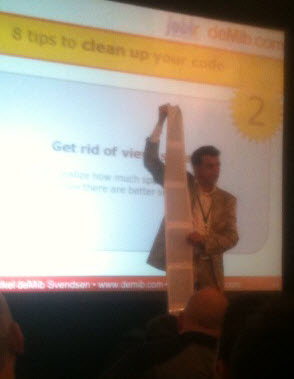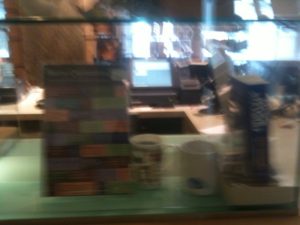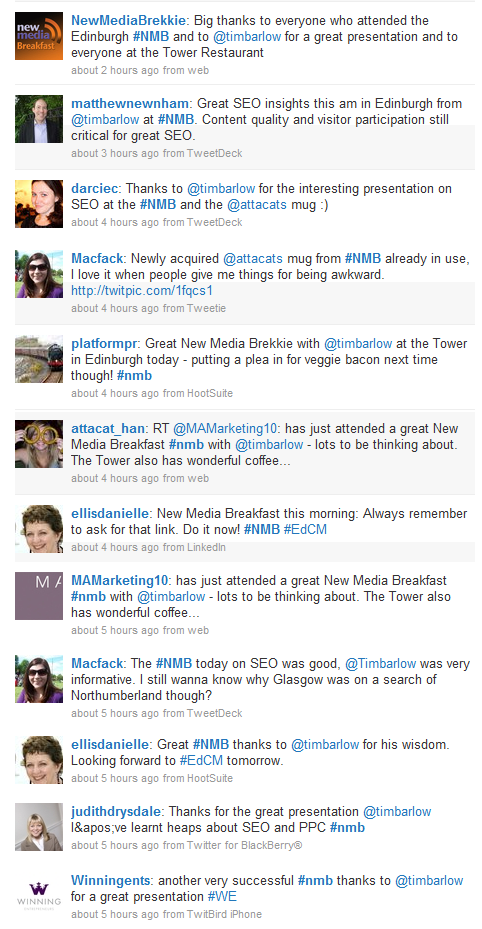This session looks at on-the-page and off-the-page factors that influence web search, to understand what remains useful, what no longer works, and what new signals are growing in importance.
Moderator: Kristjan Mar Hauksson (KH), Director of Internet Marketing, Nordic eMarketing
Q&A Moderator: Will Critchlow (WC), Co-Founder & Director, Distilled
Speakers:
- Gary Beal (GB), MD, Vanguard Online Media (Didn’t make it because of #ashcloud)
- Mikkel deMib Svendsen (MS), Creative Director, deMib.com
- Rand Fishkin (RF), CEO & Co-Founder, SEOmoz
- Rob Kerry (RK), Head of Search, Ayima
(The below are my notes from the “SEO Ranking Factors in 2010” session at SMX Advanced. They have been posted during the session and are still to be tidied. I have bolded what I consider to be the best tips. – more SMX coverage here)
Rand Fishkin
Saving his best stuff for Seattle ;(
- Search for Randon Surfer vs Reasonable Surfer patent
- PageRank is the Random surfer model which treats all links from a page as equal. Reasonable surfer updates this to add user and feature data to put greater emphasis on:
- Link position matters. The higher up the page, more weight passed
- Font size
- Summarise as: The Links on the page that people are more likely to click may be considerably more valuable
- Twitter Data influencing search?
- SEOmoz correlation work in October 2009 non compelling but end of October deal with Google and Bing so likely to be some correlation today
- Today tweets appear to be influencing QDF (Query Deserves Freshness)
- Questions over whether Tweets treated as links but assuming that they will simply due to the fact that is where the bulk of the freshness links are occurring
- Facebook Social Graph
- Does it have enough adoption yet to be useful?
- Facebook has 50,000 sites with like buttons on them (end of April) but = 0.06% of domains
- Suspects that data is not flowing from Facebook to Google. Bing on the other hand does have relationships and therefore likely to see effect of Facebook here first.
- Will Facebook build own engine? Not until there is wider adoption of sites.
- On Page Correlation Data
- Keyword or Brand at start of Title? Strong correlation between position and rank so compelling evidence for keyword first
- H1 tags – very limited correlation between rank and using H1 tags (however first words in page important)
- Alt attribute – slightly better correlated! (not that strong but good for image search so do it)
- KW density – no correlation
- Latent Dirichlet Allocation (LDA) – simsilar to LSI (Latent Sematic Indexing). Looks very promising as a ranking factor. (Use wonder wheel to get relavant keywords to include in page)
Rob Kerry
January and May SERPS updates
- 301s passing less link juice. If changing domain, build authority from scratch. Need to build links to new domain, ideally before move, then have to go to every single or consider using the canonical tag instead of 301s as they now work cross domain
- Tolerance towards spam links. Now easier to rank for home page, internal pages harder to get. Niche websites have done well. Losers are those who don’t have enough non keyword anchors
May
- Believes that changes over exaggerated. Authority sites seem to be losing out with niche sites doing better. More effort required to make pages unique. Biggest losers are search results style and category pages
Mikkel deMib Svendsen
Get rid of the Crap on your site (how to avoid losing ranks)
- Code Junkyards – lazy programmers syndrome
- Malware – caused by hackers (often ex-employees). Need to check source code regularly. Will have drastic effects on click through to your site due to “This site may harm your computer” message in SERPS
- Check software updates
- Check Secunia.com to identify vulnerabilites
- Santise all user data – check that no user input required that you don’t expect
- Check using automated but don’t rely on it (Use link tools to find strange anchor text)
- Small is Beautiful
- Site Speed (now officially a factor but MdM believes that indirectly has always been important)
- Quality of Code – all his testing has shown it doesnt matter if don’t validate (even Google doesn’t validate). However:
- Clean up code
- If 90% of your page is code clean it up
- Get rid of Micorosoft.net view_state (see picture!) – better solutions today

- Javascript should be placed in external files (just one or two file not 5 or 10!)
- Keep all CSS in one external file (don’t use inline CSS if using classes)
- Remove empty containers (e.g. divs or table)
- Remove all comment tags when publishing
- Minify or Obfuscate code (remove white spaces and line breaks – will render faster)
- Remove all unnecessary meta tags (e.g. revisit after). All DC
- Use content delivery network
- Compress objects and http response (use compression where ever poss inc http requests (usually using Gzip)
- Clean up code
Q&A
- May Day Update Highlights? RF: Unusual updates in that White hat sites have taken a hit (8-9% drop in traffic almost all in the long tail). Happened very close to the change in l00k and feel – could their be a correlation? RK: Some may have lost but others have done better. Winners are niche sites with very unique content. MdM: Lot of small changes. Change of interface could have caused drop in long tail traffic. Thinks new look is good for AdWords. Increased chances of refining searches rather than clicking through to page 2.
- Mixing US and UK results on UK SERPS? RK: Strange results less of a prob but still expect international results in local SERPS
- Strength of LDA? RF: Difficult to see correlations but more interesting is the concept that content will be more relevant if additional related terms are being seen on page. No real data.
- QDF? RF: If Google sees search volume spikes and content spikes including keywords then they will bias results to the fresh content (e.g. oil spill SERPs will not correlate with standard ranking factors). Very important for those in news. MdM: not so dramatic in non-English searches. RK: Often see US results in QDF results in UK.
- 301 Findings? RF: Hasn’t seen evidence to agree with RK but trusts him! RK: Canonicals are not perfect solution. Perfect solution is to get links redirected. Think Google may be taking a view that Canonicals are better than 301s as less easy to abuse. Thinks 95% chanaged links is practical! MdM: Concerns about canonicals – can go wrong. RF: Google over respecting the canonical e.g. big sites redirecting every page to home page. Seems to work too well, so maybe there will be a pull back from this.
- Top Tips? RF: Thinks that it is insane that Twitter content that is not being saved – webmasters should capture it. RK: If value short tail, don’t change your brand. Focus on home page. MdM: Very hard to predict, especially the future. Value of dynamic content not to be under estimated (e.g. UGC or scrapping!) – more dynamic your site the better.
- Diversifying anchor text from external links? RK: Wide array of terms to both home and deep pages – include things you don’t want to rank for and high ratio of brand links. Mess it up a bit. Maydate: Less value being placed on internal linking?
- Canonicals for internal? RK: Use rel=canonical rather than 301. RF: The significant concerns over 301 are quite new to Rand. Is it a bigger problem with more aggressive SEO? MdM: Just avoid moving. Its why its so important to make your architecture as flexible as poss.
- How important is it for the content to be the same on two pages that are canonicaled RF: Google seems to respect it.
(The below are Tim’s notes from the Keynote speech at SMX Advanced. They have been posted during the session and will be tidied up later – more SMX coverage here)
Barak is new to Wolfram Alpha (10 weeks) with a long history of working in home computing and internet (Macy’s first computer store, Apple, Infoseek, Six Apart and others). Enjoys being at the pioneer stage. Sees Wolfram Alpha as being ground breaking and will change the way we think about information.
Wolfram Alpha is one today – happy birthday!
What is Wolfram Alpha?
It mashes up data sources to give answers. Want us to see it as a “fact engine” that will change the world forever.
Can do simple maths (2+2), can forcast the weather. Uses trillions of datasets to turn linguistic queries into answers. Search for “Japan GDP” brings back lots of data. Do “Japan China GDP” it will bring back comparison data and graphs. Could potentially compare the GDP of Japan to number of goats in Switzeralnd if you really wanted. Syntax: “gdp japan/china” will compare them as ratios.
“It is not a search engine. Its a computational knowledge engine”. Aims to give you the answer on the page rather than sending you elsewhere (ala Google search)
Data is curated by PHDs who normalise the data into a structure that WA can compare to other data sets. Core engine is able to turn data into charts.
Who is Stephen Wolfram? British physicist, software developer, mathematician. All round genius. His vision is to make all factual knowledge of mankind available and computable. “Democratise knowledge and you change the world.” Barak sees WA as the next step in this progression.
Some other questions to ask WA:
- Am I drunk?
- Am I fat?
- Directions
- Chicago house prices
- Historical weather info
- President of peru 1922
- caffeine
- no 10 screw
- life expectancy male scotland
- stock prices
- What is the meaning of life
Have full genetic code of humans, mice etc. Adding more and more data all the time.
Excited by the unknown ways that people will use WA.
What Next for Wolfram Alpha?
- One of Barak’s first steps was to change iPhone app. Mobile is a key priority.
- WA EBooks – brilliant place to put facts. EBooks are rapidly changing from books in electronic format to more interactive. WA is incorported into an eBook called elements to provide additional facts. Call them “Live Books” – always updated with most current data. Explore within the book
- Widgets – embed WA in your blog, website etc. Interactive widgets e.g. check the date, tide checks, human growth charts, mortgage calculators.
- API – already used extensively by Bing
Q&A
- Copyright of Data? Very complex. Who owns facts? Have to buy some, arguing cases for others
- How does data get chosen to be included? Have more than one source of same data. No way currently to submit/sell data to WA but looking at how to do this. Plan to allow people to allow people to upload spreadsheets.
- Relationship between WA and search engines? Does Google represent competition? See it more as an opportunity than threat (e.g. Bing relationship)
- Monetisation plan? Nothing yet but that process is being looked at. Sponsored links likely to come at some point. Licensing data/widgets/APIs etc. Challange is not finding ways of monetising it but getting it right.
- Marketing strategy? Shouldn’t talk about target market for universal products but communities who care about facts. Identifying that “physchographic”
- Multilanguage? Plans afoot. Not easy.
(Disclaimer: Whilst I have no formal connection with the New Media Breakfast series, I have been a speaker and Ben will be speaking about Analytics at the next one)
“A podcast is a series of files that are released episodically” – so technically a bit more than an a bit of audio on a website.
Podcasts work a bit like Series Record on Sky+. Subscribe once and episodes will be downloaded as soon as they are published. They can be listened to at a time and in a place that suits your listeners.
Anyone can make a podcast but should you?
To make a podcast you don’t need a studio, even a good 3G phone will do. A flip camera can do the job perfectly for video (Kodak Zi8 current recommendation – get external mic). Edirol R-09 is great if you have multiple participants and is used by many journalists- £250. There’s even a pen that you could use to record meetings!
Note of caution: just beacause you have canvas doesn’t mean you can paint the Mona Lisa. Same applies for podcasts [however can you do something that is good enough?]
AudioBoo – can use it on iPad or iPhone. Gordon demonstrated how easy it is to record a quick bit of audio. This clip below was recorded live at the seminar. Great for short messages, can even use it in the car! [not if you are driving!]. Ease of upload and submission to iTunes is a key benefit of AudioBoo.
Voxie – another iPhone app (£1.79)
Caster – allows multitrack and can edit on iPad/iPhone. (£5.99)
Skype – Record interviews over Skype using Pamela plugin.
Podcasts get archived in iTunes so it’s not just about the listeners you get on release [SEO benefit too]
Bambusa – video equivalent of AudioBoo. Can use it to live stream too.
Common mistake: Reading from script/professional voice over – authentic often better.
How to Videos always do well. Record events
How often should you podcast? Depends. Quite a lot of people try to do same time each week but nature of podcasts is that you can put them up when you want – “not deadline driven”. People who subscribe will simply get it, when it goes out. Better to put one out when you have something interesting to say. Having said that keep it reasonably acitve – not months apart.
Recommended audio editing software – Audacity. Podcastmatters use final cut for video editing but often software that comes with camera can do the job. Windows Movie Maker etc can be a good place to start.
Give yourself an identity with a bit of music (think news at ten gongs) – Podsafeaudio allows you to get music that you can use.
Libsim ($30/yr) – Liberated Syndication will host your podcast and allows you to ultimately upload it to iTunes. Good stats as well. Then use Feeder (free) on iTunes to give info etc. (Easier than it sounds!).
Promoting podcasts:
- Need momentum of high number of listeners in short period of time to get it up charts
- Blog to say you have released – share on Twitter and Facebook
- Tell people its climbing the charts on Twitter on Facebook
- iTunes biggest podcast search engine
- Put video podcasts on both iTunes and YouTube (and others)
- 50% of listeners of Social Media Podcast are not subscribers
- Add your podcast RSS feeds to your website (and others if you can)
- Link where ever you can
Cost of making podcast: Variable – record lots of episodes in one day and then drip feed then can get it down to £200 an episode. Can shoot things yourself and then get Podcastmatters to edit it, upload it etc. No need for it to cost 1000s. Better to have regular content than high production. [Main cost, as with most social media is your time, so consider carefully what’s best done in house, and what is outsourced]
Q&A
- Optimum length of time? Aim Social Media Podcast at 30mins. Video – pop song length but rules their to be broken.
- Disclaimers? If your industry requires it.
- Virtualdub – can deshake videos but small tripod often best solution [I’m getting a magnetic gorillapod]
- Recommended external microphone – £10-15 lapel microphones. Can also use them on iPhone
- Demographics – similar to internet in general.
- ROI: Very difficult to measure, much like the ROI of the latest networking event you went to. Lots of good metrics available though.
- SEO: Use tags, title of podcast, description [transcripts? can Google listen now?]
- Is it possible to live stream through mobile networks? Short answer is yes.
Next Edinburgh Breakfast will be 10th of June with our very own Ben on the ins and outs of Analytics. More about the Breakfasts
I’m just back from presenting on the “Joy of Search” for the New Media Breakfast series that runs monthly in both Edinburgh and Glasgow. It was another excellent turnout (60+) and the stunning Tower Restaurant in Edinburgh provided the backdrop.
Unlike the Glasgow event we sadly didn’t have a Twitterfall in action which was a shame but #NMB has still been very busy on Twitter. (It’s going to take me a while to catch up with all the Tweets so bear with me!)
Here’s some follow up:
HTML5
Kelly (@macfack) asked a question about HTML5 which I used the “I’ll come back to you” get out of jail free card. I asked her for a bit of clarity into the question which has been very helpful, because I thought the question related more to rich web based applications (e.g. Google Wave) . Here’s her question:
As I understand it, and I’m not a code monkey so my knowledge is basic, HTML5 is going to standardise the elements in a web page that Google scans and removes the need for content to be wrapped in the <div> or <span> tags. Essentially the elements will be given their own tags like <article>, <nav>, <video> or <audio> etc so search engines can dissect a web page content easier and faster.
Does this mean HTML5 is going to make SEO easier and if yes shouldn’t we all be getting ready for this now to be ahead of the competition?”
HTML5 certainly has the potential to make life easier for search engines, particularly for making it easier (for them) to get to the heart of a web page (e.g. the article itself), whilst making it easier to not get diverted by the more “boilerplate” elements of a page e.g. headers, primary navigation etc.
At this simple web page level, will it make SEO easier? Not really in my view, it’s not a major shift from what we know the engines are capable of already, and its not that big a shift.
The progression it brings for audio and video is formalising what is good practice anyway. However, it will make it less of a hit and miss process so that has to be good news.
The more Application related side of HTML is a much more complex question (and hence my stumbling this morning!). We know that search engines are starting to support “Microformats” which are already good for tagging your review content and geo-location data in particular, so yes here’s an opportunity to get ahead of the competition.
It seems to me though that there are still many unanswered questions on some of the more advanced capabilities that HTML5 has in relation to the creation of desktop-like applications and the online/offline interactions. With my very non-technical background I surmise that it will be a long time before the search engine will have the ability to fully deal with it (especially with content that is not permanently on a page). The progression to watch is the development of the standards with respect to Accessibility and apply the old rule that if its accessible, the search engine will be able to understand it.
So should we be worrying about HTML5 – not in a big way especially for simple sites. The evolution has a long way to go yet and search engines will be a few steps behind (this despite Google’s love for HTML5 for many of its own products.)
Glasgow and Northumberland
Apologies if I gave the impression that I was going to explain this conundrum in my presentation – I wasn’t but feel free to catch me at Edinburgh Coffee Morning tomorrow and I’ll give you the very dull explanation.
Attacat Mugs
I’m pleased to say that at least one Attacat Mug has been put to good use already (@macfack again!). If you didn’t get one this morning feel free to drop into 26 St Stephen Street to get one or alternatively they are on sale at the National Museum of Scotland Shop (although their stock is limited to one – ahem)
Thank You
Thanks to:
- Anna Knight from Head resourcing for being the brave one to tell us all about her business. I hope you got some useful feedback Anna and of course a mug!
- Thanks to the Tower Restaurant for looking after us so well. (Please note the Faulty part of Faulty Tower was all our fault!)
- To the many who were kind enough to big up the event both before and after to all their Twitter followers
- To Belinda at WinningEntrepreneurs for the promotion and organisation – first class as ever.
Thanks again to the NMB team for a fantastic opportunity to talk to such a good looking and intelligent audience. (As some of you know I have been very worried about the lack of sexiness of Search with all the hype around social media, so it was great to see so many people as well as a lot of younger folk)
I’m just back in Edinburgh having had the opportunity to present on Search Engine Optimisation and Pay per Click at this morning’s New Media Breakfast in Glasgow.
(The event is being re-rerun for Edinburgh folk on Thursday April 15th – Book now!)
It was a great turn out and thanks to everyone for coming along and participating. Here’s the post seminar interview!
One of the best bits for me was the use of Twitter in the run up, during and after the event. Here are some of my highlights from the #nmb hash tag stream that was being shown live during the presentation. (not sure what’s up with Twitter’s apostrophes?)
Insight into what the audience are observing
A second opportunity to answer a question from the floor
Gordon smells a rat
Questions from beyond the room
And even a link up with a presentation happening in London
There are link building opportunities everywhere
And some nice feedback – thanks to all included below and all the others who were kind enough to take the time to Tweet.
Any further questions?
Send a tweet to @timbarlow and include #nmb in your tweet. Or you could just comment below.
And just to reinforce a point I made today…
Q: What’s been one of the best things we’ve done for our own SEO this week?
A: Speak at New Media Breakfast of course!
Yesterday I was at an event in Dublin, hosted by Google for its agency partners (that’s us!), where I was well looked after, educated and entertained royally. Luckily I wasn’t able to lay my hands on any Guinness until about 10.30 (evening not morning) so my head is reasonably clear today.
The highlight from my point of view was meeting “our team” within Google, who we work with on a day to day basis. It really helped clear up how the different individuals are able to add value to what we are doing, so here is a quick run down.
Catherine – our optimiser. She offers us a second opinion on our campaigns, particularly if we have a campaign that isn’t delivering as we feel it should do.
Ciaran – our account manager. Ciaran is our main day to day contact and also our man for technical support, particularly when things go wrong. He fends questions like “why isn’t this ad showing when it should be”. He also helps us get adverts through the editorial process quicker, allowing us to get new campaigns functioning at full speed more rapidly. One of the other bonuses he is able to offer us is speeding up the editorial process for us.
Adam – our relationship manager and reiki expert. Whilst helping us in a number of ways, perhaps the most interesting part of our relationship here is Adam giving us heads up and education on new products and features.
















